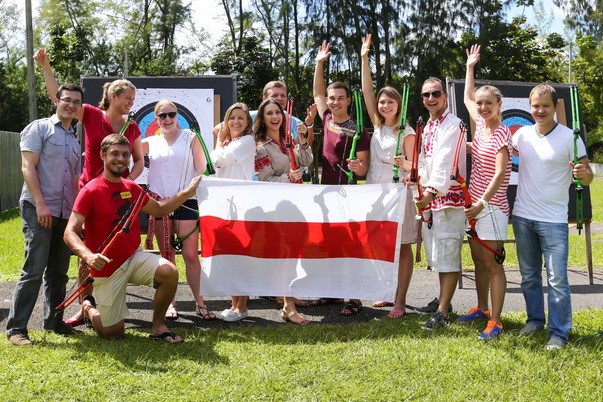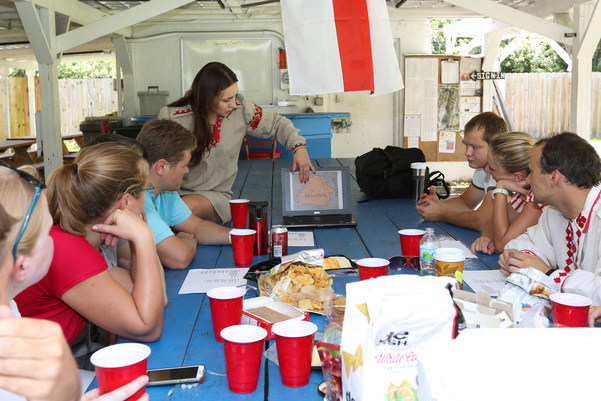Battle of Orsha
On September 28, 2014 members of South Florida Chapter of the Belarusan-American Association BAZA celebrated the 500th anniversary of the Battle of Orsha. We decided to honor the victory of our ancestors who fought in that battle by doing archery.
500 years ago the army of the Grand Duchy of Lithuania, which was almost entirely manned by Belarusians, defeated the army of the Grand Duchy of Moscow. The victory of our ancestors in the Battle of Orsha plays an important part in the formation of Belarusian national idea and Belarusian national consciousness.
Battle of Orsha is a sore spot for the Belarusian political regime
Since Belarusian President A.Lukashenko came to power in 1994, both government officials and Belarusian propaganda machine have been doing everything in their power to suppress any information about the Battle of Orsha and its historical significance for Belarusian people.
Any mention of the war between Belarusians and Russians did not fit into the plans to integrate Belarus into Russian, which A. Lukashenka so tirelessly propagandized for at the beginning of his political career as president of the country.
Despite the facts that the ideas of integration between Belarus and Russia have sunk into oblivion and that the current regime has stopped using the integration as a trump card, discussions about the Battle of Orsha continue to be banned by Belarusian authorities. Any attempts to revive them have being persecuted by law enforcement agencies of the country.
The current political regime in Belarus does not want to talk about our victory in that battle, because it contradicts official government policies, which are based on the denial of Belarusian national ideas.
The battle of Orsha is also important for Belarusians due to the fact that for the first time the army of the Grand Duchy of Lithuania fought under white-red-white flags; that flag is now associated with freedom from dictatorial policies of the current President of Belarus Alexander Lukashenka. A white-red-white flag in modern Belarus is being equated to extremism, and public wearing or demonstration of it is punishable by repressive bodies.
The battle of Orsha plays an important part in the formation of Belarusian nationality, self-identity and national consciousness. Alexander Lukashenka fears the possibility of development of national self-determination among ordinary Belarusians, because this may actually mean the end of the era of his empty propaganda, based on populism, and also destroy his idea of creation a miniature Soviet Union in the territory of Belarus.
The course of the event
Belarusian medieval music that was playing during the event strengthened our sense of belonging to the historical past. After the archery lesson, we learned Belarusan medieval prayer "Mother of God" to the accompaniment of the Belarusan musical band called "Stary Olsa". In the 14 - 17 centuries that prayer was the national anthem of the Grand Duchy of Lithuania, and was read before battles, at various ceremonies and celebrations.
"Mother of God" prayer opened a presentation about the Battle of Orsha itself and the events that preceded it 500 years ago.
That presentation sparked an interesting debate regarding both the Battle of Orsha, and its historical results, as each of us drew the information about the battle from different sources, which often contradicted each other. However, everybody agreed that the victory in the Battle of Orsha has significant historical importance both for the Grand Duchy of Lithuania 500 years ago and modern Belarusian society.
500 years ago the army of the Grand Duchy of Lithuania, which was almost entirely manned by Belarusians, defeated the army of the Grand Duchy of Moscow. The victory of our ancestors in the Battle of Orsha plays an important part in the formation of Belarusian national idea and Belarusian national consciousness.
Battle of Orsha is a sore spot for the Belarusian political regime
Since Belarusian President A.Lukashenko came to power in 1994, both government officials and Belarusian propaganda machine have been doing everything in their power to suppress any information about the Battle of Orsha and its historical significance for Belarusian people.
Any mention of the war between Belarusians and Russians did not fit into the plans to integrate Belarus into Russian, which A. Lukashenka so tirelessly propagandized for at the beginning of his political career as president of the country.
Despite the facts that the ideas of integration between Belarus and Russia have sunk into oblivion and that the current regime has stopped using the integration as a trump card, discussions about the Battle of Orsha continue to be banned by Belarusian authorities. Any attempts to revive them have being persecuted by law enforcement agencies of the country.
The current political regime in Belarus does not want to talk about our victory in that battle, because it contradicts official government policies, which are based on the denial of Belarusian national ideas.
The battle of Orsha is also important for Belarusians due to the fact that for the first time the army of the Grand Duchy of Lithuania fought under white-red-white flags; that flag is now associated with freedom from dictatorial policies of the current President of Belarus Alexander Lukashenka. A white-red-white flag in modern Belarus is being equated to extremism, and public wearing or demonstration of it is punishable by repressive bodies.
The battle of Orsha plays an important part in the formation of Belarusian nationality, self-identity and national consciousness. Alexander Lukashenka fears the possibility of development of national self-determination among ordinary Belarusians, because this may actually mean the end of the era of his empty propaganda, based on populism, and also destroy his idea of creation a miniature Soviet Union in the territory of Belarus.
The course of the event
Belarusian medieval music that was playing during the event strengthened our sense of belonging to the historical past. After the archery lesson, we learned Belarusan medieval prayer "Mother of God" to the accompaniment of the Belarusan musical band called "Stary Olsa". In the 14 - 17 centuries that prayer was the national anthem of the Grand Duchy of Lithuania, and was read before battles, at various ceremonies and celebrations.
"Mother of God" prayer opened a presentation about the Battle of Orsha itself and the events that preceded it 500 years ago.
That presentation sparked an interesting debate regarding both the Battle of Orsha, and its historical results, as each of us drew the information about the battle from different sources, which often contradicted each other. However, everybody agreed that the victory in the Battle of Orsha has significant historical importance both for the Grand Duchy of Lithuania 500 years ago and modern Belarusian society.
Бітва пад Оршай
28 верасня 2014 года сябры гуртка Беларуска-Амэрыканскага Задзіночаньня БАЗА ў Паўднёвай Фларыдзе адсвяткавалі 500 гадовы юбілей бітвы пад Оршай. Мы вырашылі ўшанаваць перамогу нашых продкаў, якія змагаліся ў дадзенай бітве, стральбой з лука.
500 гадоў таму войскі Вялікага Княства Літоўскага, якія практычна цалкам былі ўкамплектаваны Беларусамі, атрымалі перамогу над войскамі Маскоўскага княства. Перамога нашых продкаў у бітве пад Оршай адыгрывае важнае значэнне для фарміравання нацыянальнага беларускай ідэі і нацыянальнай свядомасці.
Бітва пад Воршай - гэта балючае месца палітычнага рэжыму ў Беларусі
З прыходам да ўлады А.Лукашэнкі ў 1994 годзе, дзяржаўныя чыноўнікі і беларуская прапагандысцкая машына робіць усё магчымае для таго, што замаўчаць інфармацыю як пра самую Бітве пад Воршай, так і пра яе гістарычную значнасць для беларускага народа.
Любая згадка пра вайну паміж беларусамі і расіянамі ніяк не ўпісвалася ў ідэі інтэграцыі Беларусі ў склад Расеі, якім так спрытна спекуляваць А.Лукашэнка на світанку сваёй палітычнай кар'еры ў якасці Прэзідэнта краіны.
Нягледзячы на тое, што ідэі інтэграцыі Беларусі з Расіяй адышлі ў нябыт, а сама ідэя перастала быць казырнай картай цяперашняга рэжыму, абмеркаванне тэмы Аршанскай бітвы працягвае быць пад забаронай беларускіх уладаў і спробы яе адрадзіць праследуюцца праваахоўнымі органамі краіны.
Сучасны палітычны рэжым у Беларусі не хоча гаварыць пра нашу перамогу ў дадзенай бітве, бо гэта супярэчыць ідэям дзяржаўнай палітыкі, якая грунтуецца на адмаўленні беларускай нацыянальнай ідэі.
Аршанская бітва важная для беларускага народа з таго пункту гледжання таго, што ў ёй у ёй упершыню войскі ВКЛ ўсталі пад бел-чырвона-белы сцяг, сцяг, які сёння асацыюецца са свабодай ад дыктатарскай палітыкі цяперашняга Прэзідэнта Беларусі А.Лукашэнкі. Бел-чырвона-белага сцяг у сучаснай Беларусі прыроўнены да экстрэмізму, а яго нашэнне і публічная дэманстрацыя караецца рэпрэсіўнымі органамі.
Аршанская бітва важная для фарміравання беларускай нацыянальнасці, самавызначэння і нацыянальнай свядомасці. А. Лукашэнка баіцца фарміраванні ідэй нацыянальнага самавызначэння ў свядомасці шараговага беларуса, так як гэта фактычна можа азначаць заканчэнне эпохі яго пустой прапаганды, заснаванай на папулізме, і разбурыць яго ідэю стварэння мініяцюры савецкага саюза на тэрыторыі Беларусі.
Ход мерапрыемства
Сярэднявечная беларуская музыка, якая суправаджала ўсё мерапрыемства, ўзмацняла пачуццё прыналежнасці да гістарычнага мінулага. Услед за стральбой з лука, пад акампанемент запісаў гурта "Стары Ольса", мы развучылі сярэднявечную малітву «Багародзіца». Гэтая малітва ў 14 - 17 стст. з'яўлялася дзяржаўным гімнам ВЛК і спявалась перад бітвамі, а таксама на розных цырымоніях і ўрачыстасцях.
«Багародзіца» адкрыла сабой паведамленне пра Аршанскую Бітву і папярэдніх ёй падзей 500 гадовай даўніны. Дадзеная прэзентацыя выклікала цікавыя дэбаты адносна як самой Аршанскай бітвы, як і яе вынікаў, так як кожны з нас чэрпаў інфармацыю з розных крыніц, часцяком супярэчаць адзін аднаму. Аднак, усё сышліся ў меркаванні, што перамога ў бітве пад Воршай, мае важнае гістарычнае значэнне як для ВКЛ 500 гадоў таму, так і сучаснага беларускага грамадства.
500 гадоў таму войскі Вялікага Княства Літоўскага, якія практычна цалкам былі ўкамплектаваны Беларусамі, атрымалі перамогу над войскамі Маскоўскага княства. Перамога нашых продкаў у бітве пад Оршай адыгрывае важнае значэнне для фарміравання нацыянальнага беларускай ідэі і нацыянальнай свядомасці.
Бітва пад Воршай - гэта балючае месца палітычнага рэжыму ў Беларусі
З прыходам да ўлады А.Лукашэнкі ў 1994 годзе, дзяржаўныя чыноўнікі і беларуская прапагандысцкая машына робіць усё магчымае для таго, што замаўчаць інфармацыю як пра самую Бітве пад Воршай, так і пра яе гістарычную значнасць для беларускага народа.
Любая згадка пра вайну паміж беларусамі і расіянамі ніяк не ўпісвалася ў ідэі інтэграцыі Беларусі ў склад Расеі, якім так спрытна спекуляваць А.Лукашэнка на світанку сваёй палітычнай кар'еры ў якасці Прэзідэнта краіны.
Нягледзячы на тое, што ідэі інтэграцыі Беларусі з Расіяй адышлі ў нябыт, а сама ідэя перастала быць казырнай картай цяперашняга рэжыму, абмеркаванне тэмы Аршанскай бітвы працягвае быць пад забаронай беларускіх уладаў і спробы яе адрадзіць праследуюцца праваахоўнымі органамі краіны.
Сучасны палітычны рэжым у Беларусі не хоча гаварыць пра нашу перамогу ў дадзенай бітве, бо гэта супярэчыць ідэям дзяржаўнай палітыкі, якая грунтуецца на адмаўленні беларускай нацыянальнай ідэі.
Аршанская бітва важная для беларускага народа з таго пункту гледжання таго, што ў ёй у ёй упершыню войскі ВКЛ ўсталі пад бел-чырвона-белы сцяг, сцяг, які сёння асацыюецца са свабодай ад дыктатарскай палітыкі цяперашняга Прэзідэнта Беларусі А.Лукашэнкі. Бел-чырвона-белага сцяг у сучаснай Беларусі прыроўнены да экстрэмізму, а яго нашэнне і публічная дэманстрацыя караецца рэпрэсіўнымі органамі.
Аршанская бітва важная для фарміравання беларускай нацыянальнасці, самавызначэння і нацыянальнай свядомасці. А. Лукашэнка баіцца фарміраванні ідэй нацыянальнага самавызначэння ў свядомасці шараговага беларуса, так як гэта фактычна можа азначаць заканчэнне эпохі яго пустой прапаганды, заснаванай на папулізме, і разбурыць яго ідэю стварэння мініяцюры савецкага саюза на тэрыторыі Беларусі.
Ход мерапрыемства
Сярэднявечная беларуская музыка, якая суправаджала ўсё мерапрыемства, ўзмацняла пачуццё прыналежнасці да гістарычнага мінулага. Услед за стральбой з лука, пад акампанемент запісаў гурта "Стары Ольса", мы развучылі сярэднявечную малітву «Багародзіца». Гэтая малітва ў 14 - 17 стст. з'яўлялася дзяржаўным гімнам ВЛК і спявалась перад бітвамі, а таксама на розных цырымоніях і ўрачыстасцях.
«Багародзіца» адкрыла сабой паведамленне пра Аршанскую Бітву і папярэдніх ёй падзей 500 гадовай даўніны. Дадзеная прэзентацыя выклікала цікавыя дэбаты адносна як самой Аршанскай бітвы, як і яе вынікаў, так як кожны з нас чэрпаў інфармацыю з розных крыніц, часцяком супярэчаць адзін аднаму. Аднак, усё сышліся ў меркаванні, што перамога ў бітве пад Воршай, мае важнае гістарычнае значэнне як для ВКЛ 500 гадоў таму, так і сучаснага беларускага грамадства.




